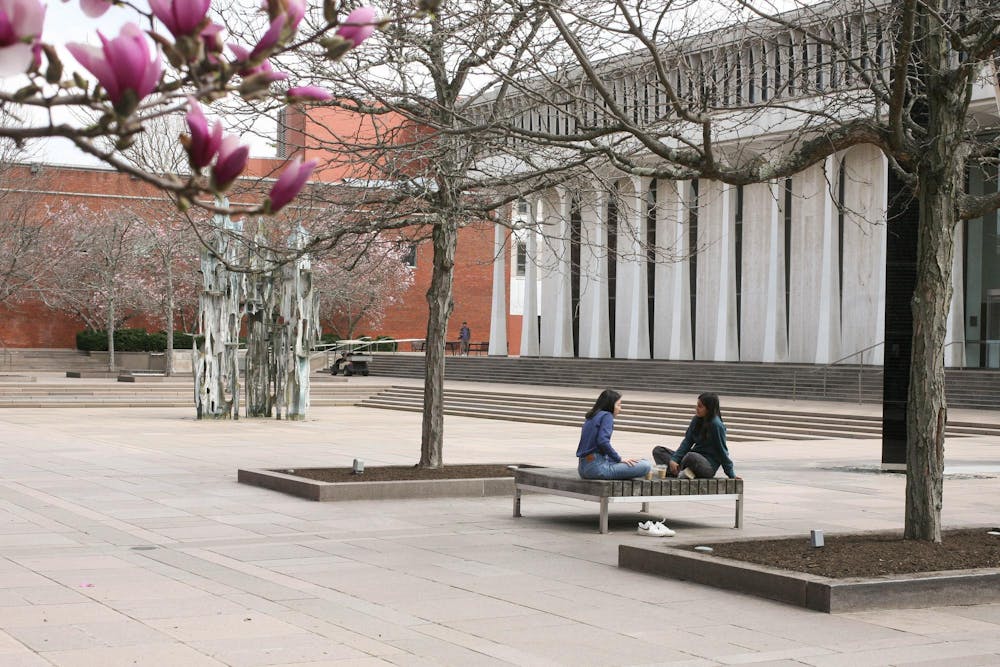Undergraduate students passed four referenda last fall with at least 65 percent of votes for a variety of issues, including divestment from weapons manufacturers, dissociation from fossil fuel companies, improving standards for student workers, and instituting a pass/D/fail option for language classes.
But several months after the vote, University administrators have indicated that the referenda will not necessarily be implemented — and the student sponsors say they are unclear on where their proposals currently stand.
“It’s very much behind closed doors. [There’s] no transparency at all,” said Anna Buretta ’27, the sponsor of Referendum No. 3, which advocated for fossil fuel dissociation.
At a meeting of the Council of the Princeton University Community (CPUC) in February, University President Christopher Eisgruber ’83 referred to the Undergraduate Student Government (USG) student referenda as “something that the student government created” and emphasized that the referenda are “not part of something that is a part of University administrative processes.” The CPUC includes students, faculty, and staff as well as top administrators like Eisgruber and Vice President for Campus Life W. Rochelle Calhoun.
University spokesperson Jennifer Morrill referred The Daily Princetonian to Eisgruber’s comments in response to questions about the status of the referenda.
Despite having no binding power over University policy, USG referenda have a long history on Princeton’s campus, often acting as a driving force behind campus discourse and, in some cases, producing tangible change.
For example, a November 2020 referendum that called for fossil fuel divestment passed with 82 percent approval among students. Two years later, in September 2022, the Board of Trustees voted to dissociate from 90 fossil fuel companies, including major players like Exxon Mobil Corp. and NRG Energy Inc (although late last year, the University said it would accept some research funding with fossil fuel companies previously subject to dissociation).
Some referenda have been more contentious, and less successful in promoting change. The Caterpillar referendum, for example, which called on the University to halt the usage of Caterpillar construction equipment, passed the student body vote in 2022 according to the rules of the USG. However, USG later upheld an appeal contesting the efficacy of the vote, choosing not to move forward with a recommendation to the University to implement the Caterpillar referendum.
Position papers drafted by the USG Senate — which outlined students’ stances on each of the referenda — were sent to University administrators on Jan. 26, as required for successful referenda.
In a written statement to the ‘Prince,’ USG President Enzo Kho ’26 and Vice President Aishwarya Swamidurai ’26 wrote that student referenda were “a meaningful mechanism for students to express their perspectives and advocate for issues they care about.” They added that USG’s main responsibility was to administer the referenda and effectively communicate the positions expressed — and that the USG Senate did not take a position on the “underlying referendum question(s).”
Bryce Springfield ’25, an organizer with the Young Democratic Socialists of America who contributed to portions of Referendum No. 2 — which advocated for improved employment standards for student workers — said that while he had met with administrators about the proposal, it was not necessarily the only end goal.
“The referendum process is a way to get people conscious about various issues,” he said. “Students do not have any democratic control over [the] University by any official means.”

These comments came amid growing frustration among progressive campus groups over the lack of administrative action on the referenda.
Buretta expressed her view on the relationship between the University and USG initiatives.
“I think that a university that thrives and prospers is one where the people running the university are in constant communication with the students,” she said. “If they’re essentially dismissing referenda then there’s literally no way for us to hold University officials accountable. And I don’t think that is a healthy dynamic.”
Kian Petlan is a News contributor for the ‘Prince.’
Please send any corrections to corrections[at]dailyprincetonian.com.








